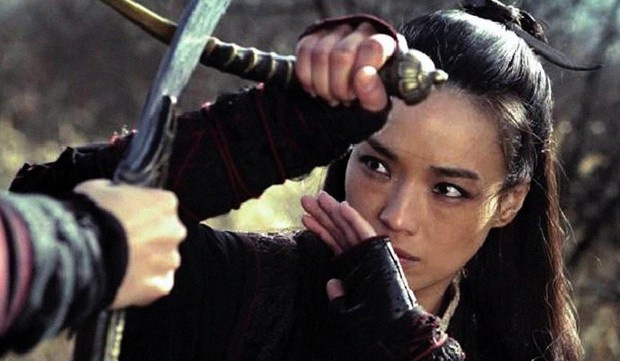Fans of Crouching Tiger, Hidden Dragon be warned: this is not that. Never have I watched a film where the title so belied the tone and pace of the story. For The Assassin is slow, glacially so, and although it really is exceptionally gorgeous to look at – every frame is a sort of cross between a Turner landscape and a Chinese handscroll, all silver birch horizons and Bacchic waterfalls – I expect a few too many ticket-buyers, enticed by rave reviews and the film’s director prize at last year’s Cannes, will be quite taken aback by how dull and impenetrable they find it.
That was not a flippant ‘all martial arts movies are the same’ reference to Crouching Tiger. Like that film, along with Zhang Yimou’s Hero and House of the Flying Daggers, The Assassin belongs to the so-called Wuxia tradition, where itinerant swordsmen and practitioners of fantastical martial artistry roam old lands, righting wrongs and showing up the failings of local government. It is eighth century China, during the golden age of the Tang Dynasty, and Nie Yinniang (played by an austerely beautiful Shu Qi) is the eponymous assassin, a deadly killer kidnapped as a child and raised and trained in the forests by a sort of guerrilla nun. When she fails to carry out one of her missions by sparing the life of a man whose young son is present, her merciless benefactor sends her on an even harder mission (obviously), to murder a man to whom she was once betrothed, now the governor of her hometown. And so it is that she must choose between her assassin’s creed and her first love, between her lives then and now.
These are serious subjects and they are analysed with great patience – but unlike films of a similar ilk – very little melodrama. Slowly, often silently, we move between politicking, fight scenes, the meetings of lost lovers. Many moments are filmed from afar, from behind the leaves of trees or a bedroom’s curtains, as if we the viewers are the assassin, watching, spying and appearing suddenly as if from nowhere. Everywhere there is a thick, nervous sort of quiet: surrounding the exquisite blueish mist of a mountainous horizon, cloaking the magnificent gold and crimson costumes of court, on the pained face of Yinniang herself. Beyond its beauty, the film’s most notable quality is its unusual preference for noiselessness. Most films nowadays make such a hullabaloo.
There’s a Shakespearean feel to the political wrangling and family tragedies of the plot, a strong, self-important sense of its own value. But oh, if only one had crib notes. So complex is the backstory and so slow is the film to explain it, with not even a hint of the kinds of demarcations that films usually employ to herald a revelation of some kind (ascending score, horrified expressions on the faces of main characters etc), that it’s too easy to miss great chunks of what is going on.
That’s not to say that there isn’t enormous skill in the kind of studied tension that Taiwanese director Hou Hsiao-Hsien builds up; there absolutely is and in many ways the film deserves the plaudits. Hell to Hollywood, Hou says. He has turned the martial arts movie on its head, rejected the Western appetite for big, boisterous Chinese films full of slo-mo, Matrix-like air kicks.
But admiration is not enjoyment. When you spend most of your time either admiring the look of the film or trying to work out what the bloody hell is going on, there’s precious little time left for enjoying it. Watching The Assassin, I felt rather like I was doing my history of art A-level again – all study and reverence and not nearly enough time for just wandering around the gallery.






Comments